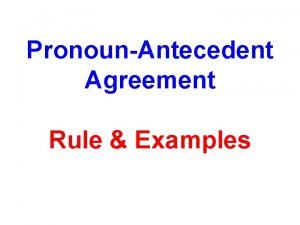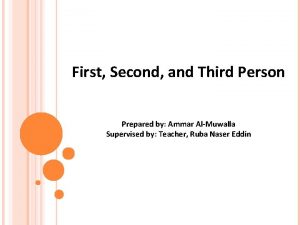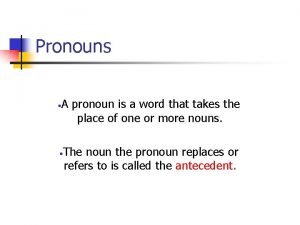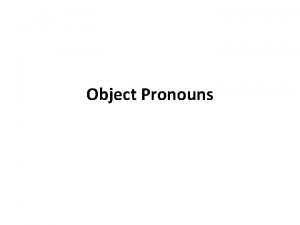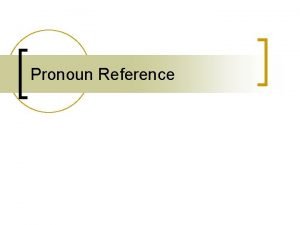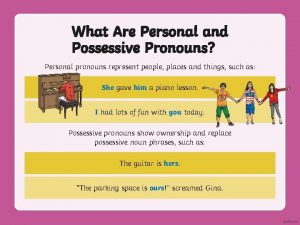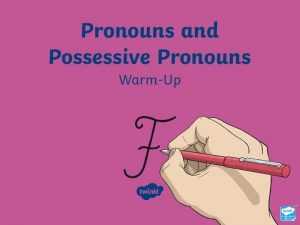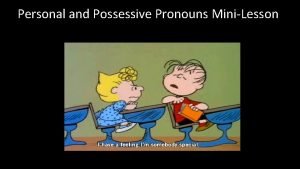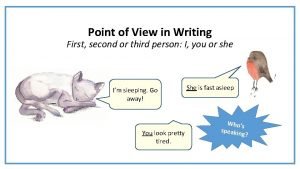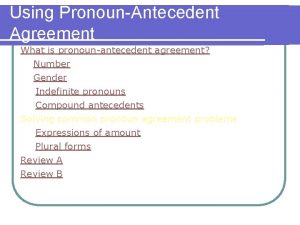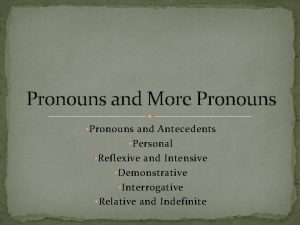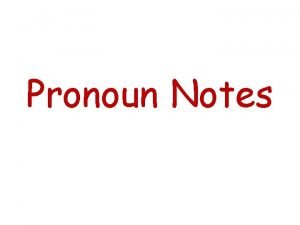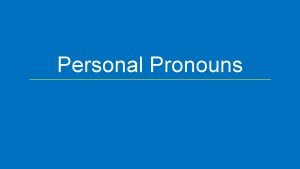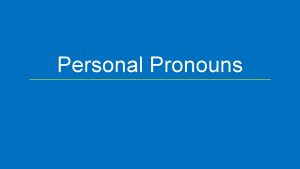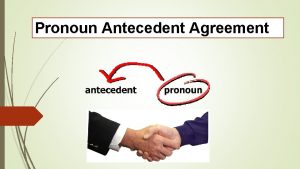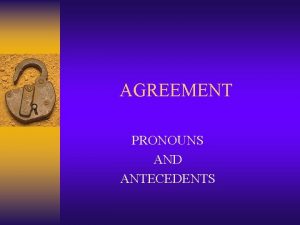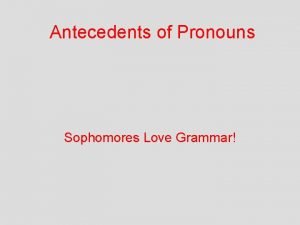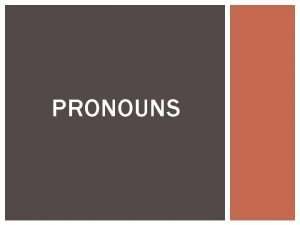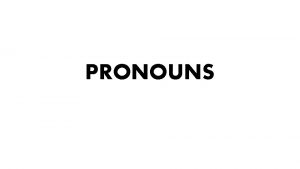PRONOUN Personal pronouns Police those antecedents First person













- Slides: 13


PRONOUN • Personal pronouns – Police those antecedents – First person – person speaking – I, me, my, mine, we, us, ours – Second – person spoken to – You, yours – Third – person spoken about – He, him, his, she, hers, its, they, them, theirs • Relative – who, whose, whom (refer to people only); which (refers to things/non-animate only); that (refers to anything).

Pronouns • Demonstrative – this, that, these and those • Indefinite pronouns – everyone, (singular) everybody, both, one • REMEMBER: A PRONOUN REPLACES A NOUN • A PRONOUN NEEDS AN ANTECEDENT( A NOUN TO WHICH IT REFERS) • A PRONOUN MUST AGREE IN NUMBER AND GENDER WITH THE ANTECEDENT (Laura – she; politicians – they; Thomas – he)

Personal Pronouns • Singular Plural Nominative - Subjective 1 st I we 2 nd you 3 rd She, it they Objective 1 st me us 2 nd you 3 rd him, her, it them Possessive 1 st my, mine our, ours 2 nd your, yours 3 rd his, her, its their, theirs

• Name _______________ Date __________ Pronouns Circle the word that best completes each sentence. 1. (My, Mine, I, Me) husband had a very busy week. 2. "Stop walking right now!" he commanded. "(My, Mine, I, Me) have to talk to you. “ 3. The student's interpretation of the story was different than (my, mine). 4. Amanda, the girl with red hair, has a dress just like (my, mine). 5. (My, Mine, I, Me) dad's boss is a nice man.

Circle the correct word to complete each sentence. 6. Kylie spoke in such a strident tone that I thought (she, her) would explode at any moment. 7. We know that when Pete tells his teacher he has not done his homework for nine days in a row, it will infuriate (she, her). 8. (She, Her) was my one and only steadfast friend all through grade school. 9. I need to learn to be more tactful so I don't always hurt (she, her) feelings. 10. We all like to go to our grandmother's house because (she, her) always finds time to pamper us.

Circle the word that best completes each sentence. 11. (Our, Ours, We) had a miscellaneous assortment of good food at our party. 12. During the program, (our, ours, we) listened to the children sing. 13. We have a surplus of antiques in (our, ours, we) attic. 14. The gas station attendant cleaned (our, ours, we) windows while we pumped gas. 15. (Our, Ours, We) is not the only lawn on the street that needs to be mowed.

• Circle the correct word to complete each sentence. • 21. After taking surveillance of our backyard, we determined that we needed to call professional landscapers to help (we, us) make it more pleasing to the eye. • 22. (We, Us) studied the vernacular of the southern people of Indonesia, but their dialect was not easy to learn. • 23. We can speculate all (we, us) want about what really happened, but we may never actually find out the true story. • 24. (We, Us) deemed the speech offensive and asked the speaker to leave immediately. • 25. Who's going to help (we, us) clean out our classrooms at the end of the school year?

• Circle the correct word to complete each sentence. • 26. (I, Me) had to throw away my old computer because it was no longer functional. • 27. I thought the dress would cost a lot of money, but it's not as expensive as (I, me) thought. • 28. (I, Me) won't be joining you for dinner tonight, but thank you for the invitation. • 29. Although I believed his lies this time, he will not delude (I, me) again. • 30. Don told (I, me) you've been to the Grand Canyon before. Circle the word that best completes each sentence. • 31. Cal Ripken is someone (whose, who's) admired by many people, not just baseball fans. • 32. (Whose, Who's) fed your pets while you were at camp? 33. Coach Williams asked, "(Whose, Who's) planning to go out for football next year? " • 34. (Whose, Who's) your best friend? • 35. I didn't know (whose, who's) games those were.

Demonstrative Pronouns • Singular Plural This these (near) That those (far) Interrogatives Pronouns Who, Which, What, Reflexive or Intensive 1 st myself ourselves 2 nd yourself yourselves 3 rd himself, herself, themselves itself Relative Pronouns That, which, Possessive Whose Objective Whom whom

Indefinite Pronouns • Always singular Both Another, Anyone, Anybody, Anything, Everyone, Everybody, Everything, Nothing, Each, Either No one, Neither, Nobody, One, Someone, Somebody, Something Always plural All, Most, None, Some Both, Few, Many, Several

Edit It 101

Using Pronouns to Give Your Writing Punch • When using this, that, these, those place a noun after them to clarify the antecedent; for example, this idea, those members of management, these solutions. In other words, use these words as demonstrative adjectives, not pronouns. • For clarity, use nouns after most indefinite pronouns: some people, each member • Double check indefinite pronouns. They can function as either singular, plural or either. • Use a possessive form before a gerund: His coming, not him coming
 What is antecedent in grammar
What is antecedent in grammar 2nd person point of view examples
2nd person point of view examples First person second person third person chart
First person second person third person chart Italicized pronoun examples
Italicized pronoun examples Pronoun agreement
Pronoun agreement Object pronouns it
Object pronouns it Personal pronouns and possessive pronouns
Personal pronouns and possessive pronouns Possessive and personal pronouns
Possessive and personal pronouns 1 person singular and plural
1 person singular and plural Person person = new person()
Person person = new person() Billie pronouns
Billie pronouns We is second or third person
We is second or third person First person vs third person writing
First person vs third person writing Plural antecedent
Plural antecedent
